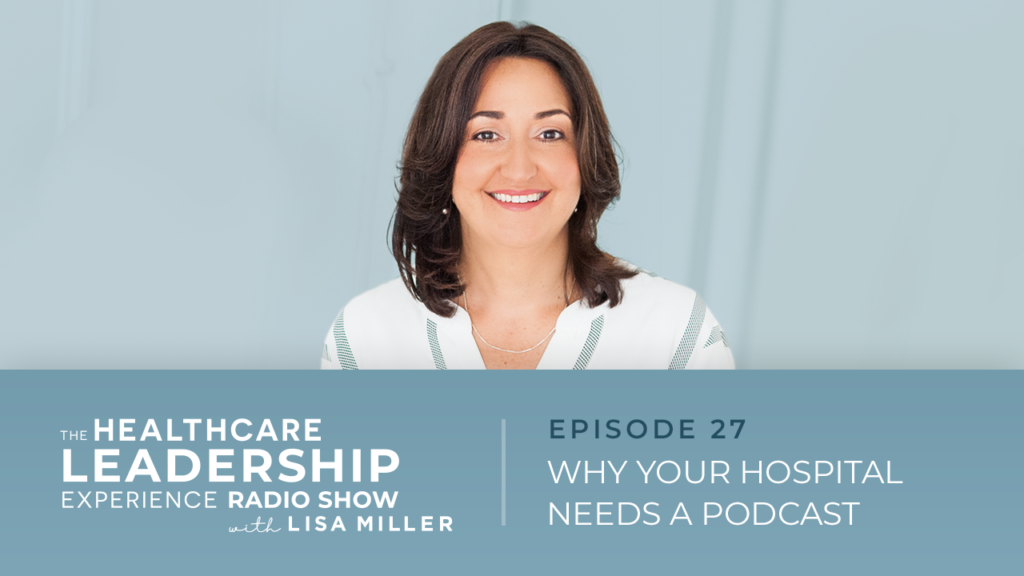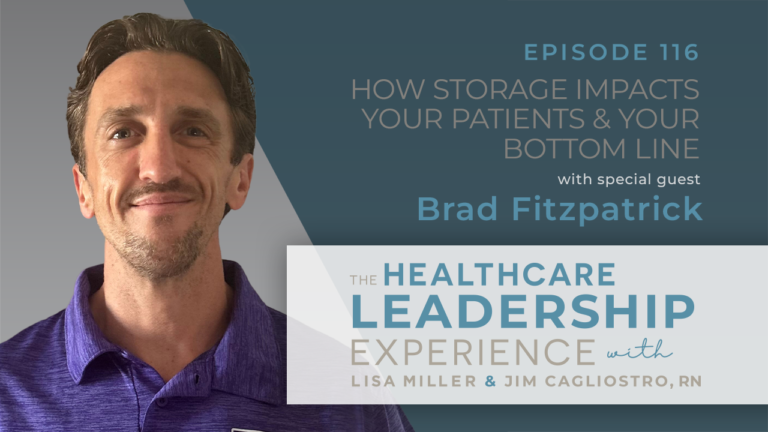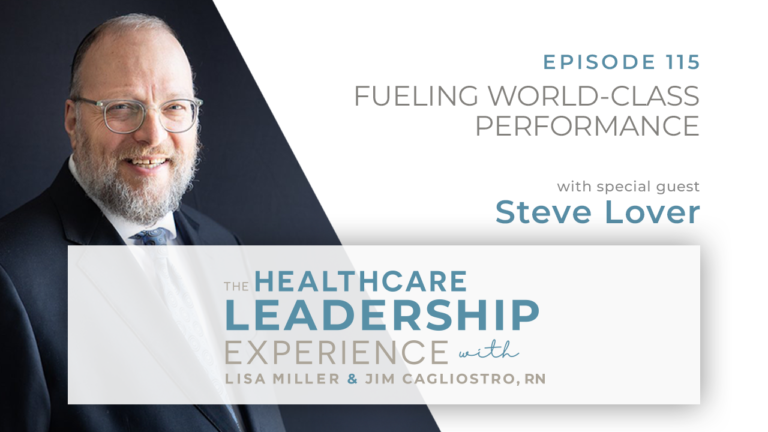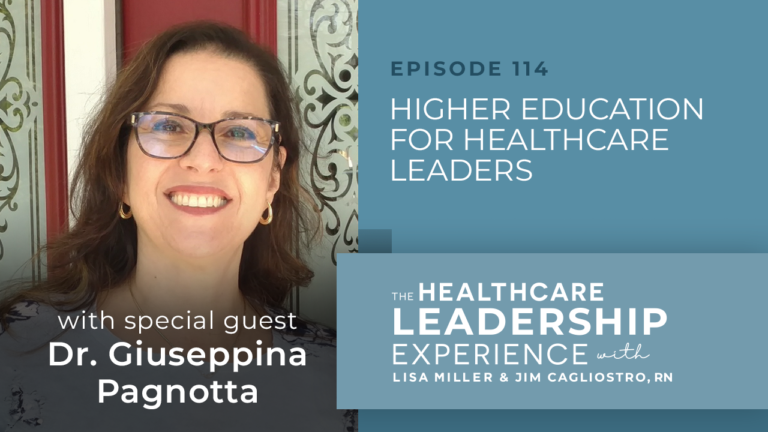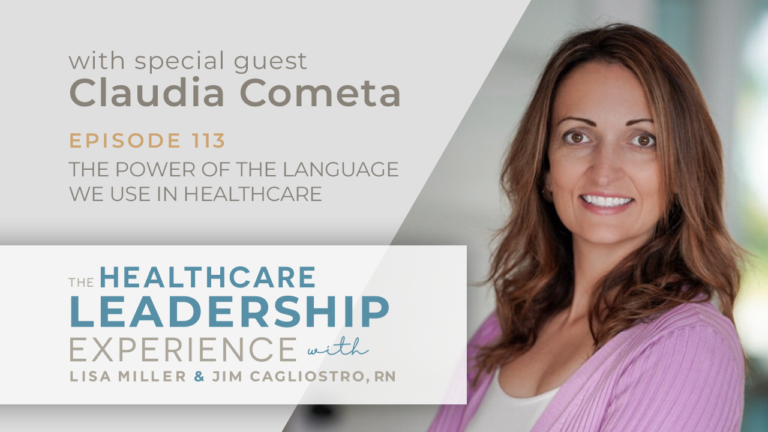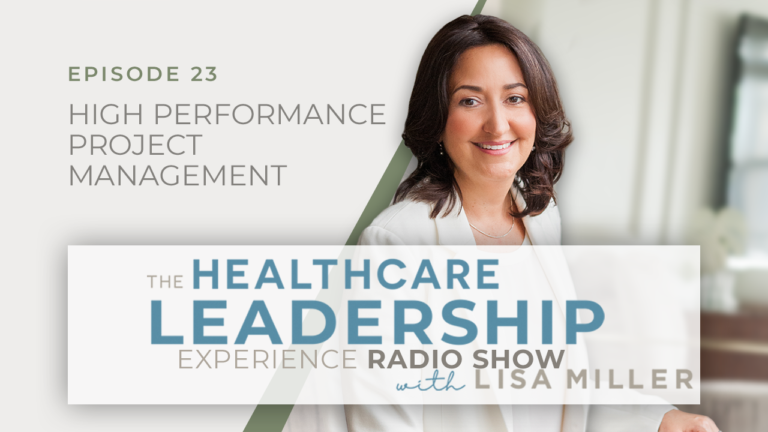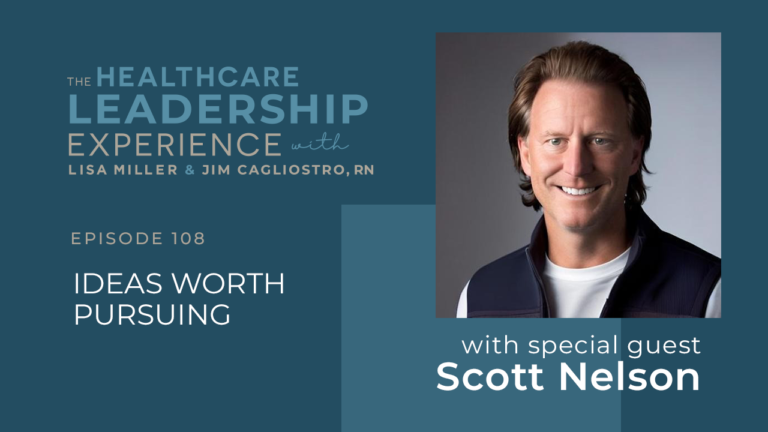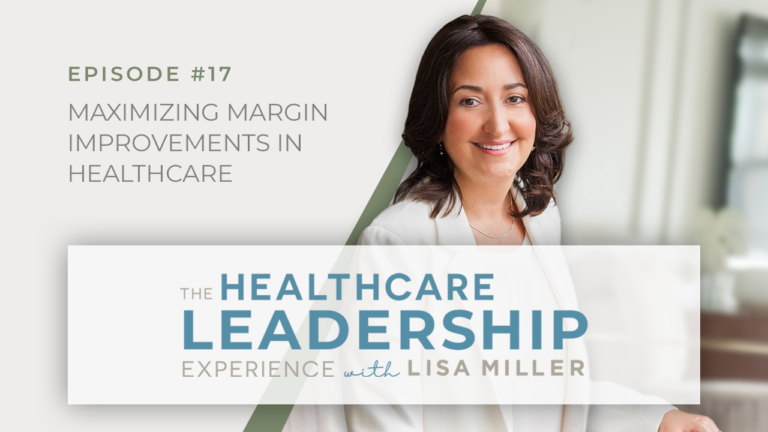In Episode 27 of The Healthcare Leadership Experience, Lisa is joined by Lisa Larter from The Lisa Larter Group to discuss the benefits of your hospital launching a podcast.
As Lisa observes: ‘’Podcasts are a phenomenal way for hospitals to share their message, to become educational, to have their physicians talk about their expertise or new innovations or just to get to know them.’’
This episode is sponsored by VIE Healthcare Consulting® which has proudly helped hospitals save $772 million since 1999.
In today’s episode you’ll hear:
The compelling statistics that should convince your hospital to launch a podcast, including:
- 104 million have listened to a podcast in the last month.
- In 2021, 41% of Americans listened to podcasts every month.
- Podcasting has now surpassed Netflix.
The biggest reasons podcasts fail to engage their target audience. Hint: Boring content is a turn-off.
The ‘’edutaining’’ value of podcasts and why the time to start is now. ‘’Those that start now will definitely be leading the way.’’
How the SEO benefits of podcasts could help to reduce your hospital spend on paid organic search. ‘’Page search is great, but even better is coming up on the top of Google ….with a podcast that’s answering the questions your patients are looking for.’’
The key things every hospital should consider when starting a podcast – and why a clear strategy is essential for success.
Why we need to make healthcare more human when it comes to podcasts – and why SEO is like stealth marketing. ‘’It can be used to create small, short-form pieces of content. It can be used to create social media posts…. audiograms… TikTok videos.’’
The importance of hashtags and the need for a memorable podcast name.
VIE Healthcare’s exciting announcement for a hospital podcast pilot – you heard it here first!
For more on marketing in healthcare, listen again to Episode 2 of The Healthcare Leadership Experience.
Contact Lisa Miller at lmiller@spendmend.com today to be part of THLE’s pilot hospital podcast.
CLICK HERE TO DOWNLOAD THE PDF TRANSCRIPT
Connect with Lisa:
📧 lmiller@spendmend.com
📱https://www.linkedin.com/in/lisamiller/
CLICK HERE TO OPEN THE FULL TRANSCRIPT
Lisa Miller (00:00): Podcasts are a phenomenal way for hospitals to share their message, to become educational, to have their physicians talk about their expertise or new innovations or just to get to know them. I feel like this is an enormous opportunity because podcasts can be searched o- on Google, and as hospitals are utilizing paid search, SEO search, their websites, looking for all these ways to be competitive, having a really well-planned, thought-out podcast that’s strategic, you know, strategic to the service line they wanna promote, strategic to the hospital branding, conversations with different people in leadership in the hospital, but it has to be compelling and interesting. Announcer (00:51): Welcome to The Healthcare Leadership Experience, a place where healthcare leaders will share proven strategies and innovative approaches to leading the clinical and business side of health care. This show is sponsored by VIE Healthcare Consulting, who has proudly helped hospitals save over $700 million in non-labor costs since 1999. Here is your host, Lisa Miller, Founder and CEO of VIE Healthcare. Lisa Miller (01:14): Hello, this is Lisa Miller, and this is The Healthcare Leadership Experience. And today, I have a special guest, who’s actually our producer, but today, she’s also our special guest. I welcome Lisa Larter. How you doin’, Lisa? Lisa Larter (01:28): I’m good, Lisa. I’m excited about this conversation. I think it’s gonna be a really good one. Lisa Miller (01:33): It is, and this is now our second conversations because we had previously talked about marketing in an earlier episode. But today’s episode, I am equally excited about. It is Why Your Hospital Needs a Podcast, and we have a lot of information about why your hospital needs a podcast. But I’m gonna start with the statistics, right? And it’s gonna be a few different views and layers on the stats about podcasts, but it’s important. And it’s relevant to hospitals. So, there’s a couple of studies that have been done. We’ll include those in the links of this show, but lemme start with 50% of all homes are podcast fans. Now, that’s in 2012. I’m gonna give you some more recent stats. That mean … That is 60 million homes. 37%, 104 million, have listened to a podcast in the last month. That stat’s in 2020. Podcasts are listened to at home, in transit, at work, and other places like gyms, right? And so, what’s interesting is the listenership, right? 78% of Americans are now familiar with podcasts, and that’s 222 million people are interested in podcasts. And in 2022, 57% of Americans have listened to a podcast up from 2019. A couple more stats and we’ll get into the show. What I found interesting is the growth, right? So, in 2018, ’19, 2020, and 2021, the growth rate is 26%, 32%, 37%, 41% of Americans were listening to podcasts monthly, and the fastest growing segment is who? Is older Americans. From 2020 to 2021, the percentage of Americans ages 55-plus are the greatest number of listeners and consumers in the U.S. of podcasting every month, and it has, podcasting has surpassed Netflix. Now, I can go on and on and on about the stats if you don’t want homework, (laughs) but I started with the statistics is because podcasts are a phenomenal way for hospitals to share their message, to become educational, to have their physicians talk about their expertise or new innovations or just to get to know them. However, I think the problem is is that some of these podcasts, some hospitals have started to, to have podcasts, and they’re boring. Lisa Larter (04:22): Absolutely. Lisa Miller (04:24): Doctors are droning on about things, and it’s terrible to listen to. It’s, it’s just painful to listen to. And so, what we need to do is to make these podcasts interesting. You know, maybe they’re 15, 20 minutes. In fact, they could be longer is if they were interesting, that they had a plan, they had a producer talking with them, if they had interesting aspects. And I feel like this is an enormous opportunity because podcasts can be searched o- on Google, and as hospitals are utilizing paid search, SEO search, their websites, looking for all these ways to be competitive, having a really well-planned, thought-out podcast that’s strategic, you know, strategic to the service line they wanna promote, strategic to the hospital branding, conversations with different people in leadership in the hospital, but it has to be compelling and interesting. So, I’m gonna stop there and would love to get your insight. Why is podcasting an important marketing vehicle? Lisa Larter (05:31): Well, I think, you, you know, there’s a few things. First of all, every new car has podcasting built into it, and so people are listening to podcasts in their car instead of radio because one, you know, podcasts tend to be free for the most part and two, they don’t have to listen to the advertisements and three, they’re getting educated when they are listening. The other thing that we’re seeing right now, even in the mainstream media, is media personalities are hosting their own podcasts in addition to the shows that they host on TV. And so, when you start to see the media and celebrities stepping into the podcast space, they are actually making podcasting more of a mainstream communication platform. And so, when hospitals step up and they look at podcasting as a way, I’m gonna call it to edutain their patients. They wanna educate them. They wanna entertain them. They want to engage them. I think there’s a huge opportunity. But I think the vast majority of hospitals probably don’t quite know how to do this, and if they wait too long, those that start now will definitely be leading the way. Lisa Miller (06:46): So, it’s so true. It’s interesting because in my research, the number one genre for podcasts is comedy. The second is education, so your edutain thought is totally, uh, spot on, and the, that’s the opportunity, right? The opportunity is to have really smart, fun, educating but interactive ways to utilize a podcast, and if you think about a health system and how much they spend or how much they focus on having a competitive advantage and their marketing dollars, it’s so interesting that for a relatively low-cost investment, they could have a high performing vehicle. Again, it’s not a vehicle where you just have a doctor or doing a Q&A, and they’re talking about a procedure. It, it really has to be strategic. So, if I’m the, uh, CMO, I’m lining up my strategic initiatives. Where do I want growth? If I want growth in orthopedics or spine, what are those service lines, or if it’s branding, then I’m building around those strategic initiatives conversations with physicians but making those conversations different and interesting, maybe a little bit about their personal lives. Lisa Larter (08:14): Yeah. I think there’s a bunch of different angles that hospitals could take, and that’s the beauty of podcasting is, uh, you know, because it’s audio for the most part, it is very easy for people who work in a hospital who are maybe not as comfortable being on camera to be able to step up to the mike and have a conversation. So, I’m just thinking about myself, and, m- I have Crohn’s disease. So, if I was having some challenges with my health right now and there was a targeted show that was specific to, uh, IBS, Crohn’s disease, colitis, I might actually listen to that so that I can learn from those people. And at the same time, over my lifetime, I have spent a lotta time in hospitals, in a hospital bed. What do you do when you’re in a hospital bed? Ya scroll on your phone. You listen to things on your phone. You watch things on your phone. Can you imagine if a hospital started to behave a little bit like Southwest Airlines, and all of a sudden, they had some patient message that they broadcast every day through a podcast channel that was a little bit funny, a little bit educational, a little bit reassuring for patients to listen to while they’re actually in the hospital? Like, there’s two different angles here, right? One is an angle that could be directed at attracting the types of patients that they want to their hospitals, but the other could actually be to really enhance the patient experience for those people who are in the hospital. Lisa Miller (09:56): Yeah. What a great idea about enhancing the patient experience. Y- I don’t know if you’ve ever seen some of those videos. You see it sometimes on LinkedIn. And they get just this huge engagement where the, um, the OR staff might put on some kind of fun music before a case, and the doctors and everyone are kinda dancing a little bit. And it, you know, it, it might be a pediatric case, and everyone’s kind of, you know, like moving around and, you know, having fun. And they get huge engagement, and it’s wise because now we’ve humanized health care. And we’ve made these clinicians and doctors real people, which, of course, they are, and that’s what we want as patients. And those … It, it’s fun, you know? And, and there could be a fun aspect to, to the podcast, right? It could be a way, you know, to engage patients on a daily basis. I love that idea, Lisa. Lisa Larter (10:49): Right. And it gets patients talking about your hospital, and it makes you different. Lisa Miller (10:53): Yeah. Lisa Larter (10:53): It makes you different from everyone else because you’ve found a way … Like, it just reminds me, uh, the idea, it, it brings me back to school, like, (laughs) I feel like in the olden days when the principal used to do a message every day to all the students, right? It’s just a fun way, I think it could be, to really engage your patients. But then, the ripple effect of that is your patients start to talk about what you’re doing to other people, and that feeds the attraction piece of wanting to learn more about, you know, how the hospital serves on specific areas that are important to them based on the strategy that they put together. Lisa Miller (11:31): It’s a great point. I remember a few hospitals would do videos and kinda have a video, uh, of, you know, different leaders and doctors in the video feed on TVs in the hospitals, in the hallway, or in their patient rooms, and I felt they were good, some better than others. Again, I hope I’m not getting anybody upset with me, but the vast majority of them are boring. (laughs) And, you know, people listen to podcasts because they are constructed in a way that they’re interesting and that someone’s, just again, not going on and on and on a, on a point or maybe s- maybe speaking in clinical terms that we don’t understand. So, there has to be this dialogue, and it can be funny. It can have a really, you know, uh, intelligent, cerebral doctor, and the interviewer’s like, “Wait a minute. Hold on. (laughs) You’re getting way over our heads. Can you bring that back a little bit?” But, like, and being able to humanize again the diagnosis, treatments, their approach, I think there’s better ways to do that so they do engage patients. And in fact, patients wanna to learn. If I hear let’s say an orthopedic doctor talk about a knee surgery, and, you know, they’re giving practical examples, pragmatic examples, and talking about pre-rehab and why that’s important and then just in interesting way, and maybe their examples in their own lives, y- you know, you’re almost going to feel like when you pick up that phone, you know, that doctor already. Lisa Larter (13:06): Absolutely, and I think that, you know, in addition to the reviews that people read about doctors online, what a great extension of a review to actually hear the doctor’s voice, to hear the empathy that they feel for the patients, and to hear the approach that they would take. Lisa Miller (13:22): I agree. You brought up a really good point because there’s reviews on podcasts, too, right? So, it does add to the reviews, and I know you were, you know, taking that in a little different perspective. But, yeah, the reviews are important. It’s the connection. And the other aspect of this, and, and we’ll touch on this in a little more depth in a minute, but it’s the SEO benefits of podcasting, too. Lisa Larter (13:45): SEO is super important. Let’s talk about that now ’cause I know you, even as a business owner, have seen lots of benefits through SEO from your own podcast. Lisa Miller (13:56): Yeah, absolutely. So, about a year ago, I started down this road of how do we get more organic searches? And that process led me into (laughs) the world of SEO, which is a lot more complex than what I imagined and I think what most people imagine because there’s a technical aspect, as you know, Lisa, and then there are other aspects like content and keywords and all those things have to work together, and link building, which is really important as well. So, you’ve got these pillars, and what we’ve found is after we really focused on the technical aspect, there was still quite a bit of work on strategy as it relates to what our business objectives were, as it relates to, you know, what kinda content we were gonna put out, who we wanted to be to connected to on links. But let’s talk about the content. So, the content, of course, there’s written content, which is a whole nother podcast we should have because I think hospitals and their websites need to really improve on their written content. But because, um, Google loves video and audio, I think they’re spending a lot more time on audio search. Uh, starting this year, the podcasts will increase your link building which will increase the fact that when people search, your hospital comes up. But more importantly, if you’re attaching this to a business objective and a strategy and you’re focused on that content, that will come up on Google searches. So, can you imagine hospitals spending literally 10s of thousands of dollars a month on page search? Which is great. Page search is great, but even better is coming up on the top of Google without being a page search with a podcast that’s answering the questions your patients are looking for. Lisa Larter (15:50): Right, and a lot of people don’t even know where to look in terms of understanding what keywords people are searching or what questions people are asking. And so, I mean, I know we’re gonna talk a little bit more about things that you need to consider when starting a podcast, and strategy is definitely number one. But that should be part of the strategy is really understanding, you know, from a keyword phrase perspective, what is it that your patients or your potential patients are looking for, and how do you become a match to the query that they have put into a search engine? Lisa Miller (16:29): Can you talk about that? Because you and I have done a, a lot of that researching what people are searching and then building content. Lisa Larter (16:36): Yeah. That research is painful, hard work to do it by yourself. You really have to dig, and you have to know what tools to use. But it’s also super impactful because when you understand, when you do the work to really understand what people are looking for organically, and when you do the work of, you know, cross-referencing the phrases and the questions and what else are they looking for, and, and really get clear on those things, then you can build a content plan around the types of things that people are looking for. So, you just talked about, you know, orthopedic surgeons as an example. Maybe orthopedic surgery is one phrase they’re looking for, but maybe they’re looking for orthopedic surgery knee replacement, orthopedic surgery hip replacement. Lisa Miller (17:25): How ’bout this, Lisa? What is the recovery time of orthopedic surgery? What is the pain in orthopedic surgery? We need to make health care human. What are people really thinking? See, we have a perception of they’re searching knee replacement, hip replacement, and they probably are. But actually, what are they really searching? Lisa Larter (17:48): Right, but there are tools that tell you that. Lisa Miller (17:48): Absolutely. Lisa Larter (17:50): So, I can type in, “knee replacement”- Lisa Miller (17:50): Yes. Lisa Larter (17:53): … and I can see the questions that they ask. So, I’m gonna give, uh, our listeners a little insider secret here. In preparation for the shows that Lisa and I do together, we have a list of talking points. Well, those talking points are questions, and the reason that questions are important is because from an SEO perspective, people are typing the question into the query not the answer. Because if they knew the answer, they wouldn’t be searching for it. And so, if your hospital gets really clear on the questions people are asking and the information that they’re looking for, you can build a podcast around those queries, and you can build out content that has those questions clearly defined in your show notes, which actually, it’s like adding gas to the fire in terms of making your hospital found through organic SEO. So, I, I mean SEO … I gotta tell you, Lisa. You and I have a long, uh, journey. We’ve had a long journey together in terms of SEO, and I have learned a tremendous amount about SEO because of you and your tenacity around really, really, really wanting to understand it. And I think that, you know, there is just so much wisdom that you bring to the table on this topic, that I am going to guess, just based on my own experience, the vast majority, 99.9%, of hospital employees responsible for marketing likely do not know. Lisa Miller (19:33): Thank you, Lisa. I was almost forced into doing, uh, that and being so tenacious about it because, you know, we’re a small boutique company. You know, we’ve b- been in business for 22 years. We have about 15 employees, and we service hospitals throughout the country and all different sizes, from critical access to some of the largest health systems. However, we compete against to a lot of really big, big other firms. (laughs) Lisa Larter (19:33): Mm-hmm (affirmative). Lisa Miller (20:00): You know, we’re the specialists. You know, we’re the go to, you know, in terms of cost and margin improvement, and we’ve got our, you know, data analytics superpowers. But we still compete against those large, large companies, and they are going to outspend us for paid advertising. You know, we’ve done paid SEO and paid aspects, um, but what I decided to do was to really build a strong, organic SEO strategy. And it’s working, and it’s so exciting to see it work. But it’s a lot of work, but once it’s there, you just keep on building momentum. And so, that’s why when you and I were talking about different topics, I felt l- like, you know, a- as we were talking about podcasting, we, you know, we’d really felt like this would be a great opportunity for hospitals to prioritize and, uh, a, a way that, you know, we could also have an offering to hospitals because of our experience in this podcasting world and also in the SEO world. What I, what I will talk about for a minute on the SEO side is is that, you know, this is like stealth marketing. Lisa Larter (20:00): Mm-hmm (affirmative). Lisa Miller (21:10): You can have a small hospital that’s trying to compete with a giant. I’m gonna tell you that this is the way to win. It is. You could be highly strategic, and you’re going to catch the big companies off guard if you can use podcasting and utilize it in that way for SEO to catch them off guard and use it again, not in the typical format. It’s gotta be things like type in “hip replacement”, and then you’ll see in Google what people are asking. There’s five questions they’re asking, so this is a tip. This is a tactical tip, everyone. Type in “knee replacement, spine replacement” and you’ll see in Google what people are asking. Take those questions ’cause that’s what people are asking and build your content and your podcast, particularly your podcasts, around those questions because then, th- that’s the human side to this. So, I will give everyone another tactical example. Um, answerthepublic.com is another th- way you can search what people are asking for. So, these are just tactical ways to build into your podcast and your content not, “What is a knee replacement?” And people wanna know, but the reality is, they have other questions. So, for me, I had a, a procedure that I was s- supposed to have. I turned out not having it, and I was trying to understand the procedure. But I have to tell you, the one question in the back of my head was, “Is it gonna be painful?” And, and it was funny. There wasn’t a whole lot written about it. I had to really dig, but pain is a really interesting topic that I think health care has to address more on, on a number of areas. But my point is is that I was doing the educational research, but I was also wanting the human aspect, which was pain, recovery, what to expect. And I think if hospitals are building their podcasts around those other aspects and doctors talking about that are maybe their unique approaches, that’s the difference. And I had one doctor … I’m sorry. I, I had a OR nurse tell me once, we were talking about knee, knee surgeries and pain, and my mom was going in for a case. And she was just saying, “Oh, this doctor, he is the most conscientious about the pain for their patients.” Like, he call, they called him, like, Dr. Love or something like that just ’cause he was so kind because he really was so attentive, and it’s just a, an extra protocol. And what an interesting story it would be if that doctor were sharing that or the nurse was sharing that, you know? And someone’s like, “Oh, I want Dr. Love” (laughs) or whatever the name. Lisa Larter (23:43): Right, and the other thing is people avoid pain. Lisa Miller (23:45): Yeah. Lisa Larter (23:46): So, if the story you’re telling yourself is a procedure is going to be really painful and really awful, you might delay the procedure or choose not to do the procedure because you’re so afraid of the pain. Whereas, if somebody could reassure you that it wasn’t going to be as bad as the story you were telling yourself through content and through discussions, then that’s an additional win. I also think, you know, we’ve talked a lot about SEO. The spin-off effect of, you know, creating a podcast for a hospital is there’re so many marketing elements that can be mined from the creation of a podcast. So, you’ve recorded a podcast, and you have audio. That audio can be transcribed. That transcript can be used to create long-form content. It can be used to create small, short-form pieces of content. It can be used to create social media posts. You can use the audio to create audiograms, videos with words, TikTok videos. Like, you name it. There’s so much that can be mined from that one effort. And when you say, “SEO is stealth,” you start to layer SEO, uh, thinking into all of those marketing elements, and you’re getting an even bigger gain on your marketing efforts. Lisa Miller (25:08): Yes. I love that, and the other part to that, you know, Instagram, Facebook, all those areas where you can use audiograms take the content. That content is probably some of the best content they’ll ev- they’ll ever get written because it’s conversational and, and a little free-thinking as well as having the expertise. But the other part of it is LinkedIn. You know how we’re seeing hospitals on their company page post more, and they can use some LinkedIn. The doctors can use their LinkedIn profile. I think another underperforming or underutilized social platform is LinkedIn. We have professionals there, hospitals, physicians, clinicians can start posting aspects like you said of the podcast, and people who want to will consume it. They, they want to consume. It’s a great place there for them to focus on that. Lisa Larter (26:00): Yeah, absolutely. I just looked up knee replacement on Instagram. The knee replacement hashtag’s been used 81,000 times. The knee replacement surgery hashtag has been used 12-and-a-half thousand times. Knee replacement recovery has been used 5,000 times. Knee replacement surgeon, 646 times. Lisa Miller (26:22): It’s such a huge opportunity, Lisa. Lisa Larter (26:23): Huge opportunity if people just really understood where they need it to be found. It’s not, you know … People use hashtags without understanding what hashtags are. People follow hashtags because they’re interested in the information related to the hashtag. They can’t follow you if your hashtags are not intersecting with what people are following. Lisa Miller (26:46): Yeah. Lisa Larter (26:46): And you can’t use the right hashtags if you don’t do the right keyword research to know what people are looking for. Lisa Miller (26:53): Yes, and, you know what’s so interesting about everything we’re talking about i- is that it doesn’t require an enormous amount of money. In fact, they probabl- a hospital probably can reduce their spend. It’s going to require the right partner, the strategy, the thinking, the development of it. They’ll probably have bigger wins or bigger opportunities from this kinda strategy than just telling somebody, “I have an ad budget of $10,000 for orthopedics.” Lisa Larter (27:20): Yeah. Lisa Miller (27:20): “Here. Go run an ad budget,” which I, I, uh, you know, I see some of these, and I see the landing pages or see the tactics. It hurts me sometimes because the money is getting wasted because e- e- a, a lot of those ads aren’t effective. They go to a landing page. There’s no, you know, call to action or no way to send information or, it, it, you know, it’s, um, you know, it’s not a way that patients can be followed up. So, as we start wrapping up, I have two last things to talk about. One is a lotta hospitals have effectively used TV ads to share patient stories, right? So, you see these very compelling stories, you know, human stories of some incident, and the hospital taking care of a patient and their family. And it was a challenge, and they came through it. And they just can’t thank the hospital enough. The people were great, and these stories are fantastic. With the advent of Netflix and other streaming services, I think that those are, are they’re gonna become challenged. Hospitals can use podcasts as even a better way to tell these patient stories. In fact, they could be a long form. You know, that conversation could be 10, 15 minutes not 30 seconds and really get a conversation about the details and the insights in a 10-, 15-minute podcast that you couldn’t get into 30 seconds. How powerful would it be to have a long-form patient story and- Lisa Larter (28:43): A patient experience podcast. Lisa Miller (28:48): The patient experience podcast, so that, and (laughs) that’s great. And that is a perfect- Lisa Larter (28:49): We should buy that domain. Lisa Miller (28:51): Yeah. (laughing) Maybe you should get the Patient Experience Podcast. That is a segue into what you should consider if your hospital wants to podcast. Let’s start with the name, you know? Um, I know we’re gonna jump outta order a little bit, but getting a unique name is so important, right? So, it’s not General Hospital Medical Center podcast. Like, have some fun with it. Maybe engage your employees or even patients and families but get a really unique name that stands out, right? That’s a, has some personality. So, the name is first. But actually, a name is third, but I brought the name up now. So, do you wanna talk about a little bit about the other elements, Lisa? Lisa Larter (29:29): Yeah. Well, I think there’s a lotta things you have to consider when you start a podcast because, y- you know, if, if you don’t have a well thought out strategy, then you are going to show up at the microphone and, and not know what to say. And so, I think the most important work that you do is really building out the strategy and understanding what the goals and objectives and outcomes are that you are looking to achieve as a result of, you know, initiating a podcast. I think that there are many different ways that you can approach podcasting. You know, on my podcast, She Talks Business, I, I create seasons where I have themed topics, and I do a bunch of shows around a specific topic. That’s one way of doing it. Another way is to do a bunch of interviews on random topics, so you really need to think through what is going to be the most effective strategy and frequency for your hospital. And then, what you need to do is you need to build out a content plan. And when you build out that content plan, that’s where you do all of the SEO work, and you get really clear on the titles, the phrases, the questions, the topics, who the person should be, and you really, you wanna build that out at least a quarter in advance, if not six months in advance, so that you really know what it is you’re doing and how you are going to approach each show so that you can maximize the effectiveness of each show. You know, we talked a lot about that in the SEO part. The part of the content planning is making sure you’ve got those right questions and you’ve got those right topics so that the podcast can extend into a more powerful marketing element for your hospital. Naming and branding is obviously important. I always say to people, “You need a, a show name that you can hear somebody else saying, ‘Oh, you should listen to …’ whatever.” If it’s not- Lisa Miller (31:25): She Talks Business. Lisa Larter (31:25): Yeah. You should listen to She Talks Business. You should talk or you should listen to The Healthcare Leadership Experience. Like, it’s got to be memorable in some way. It can’t just be your hospital named podcast. That’s, that’s not memorable. You want it to be pithy. You want it to be fun, and you want the brand to be something that can complement your hospital’s existing brand but is a standalone brand on its own. Because there are some strategies around production of your podcast on a separate platform from your hospital website for link building and, and all of that. So, you have to almost think of it as its own brand, its own separate entity. And then, you need to think about things like a frequency. Is this a daily show? Is this a weekly show? Is this a, you know, a couple times a week? And what about production? Who is going to do the production for you, and what are the different elements of production? Are you gonna have advertisers on your podcast or not? Are you going to work with a producer, which I highly recommend, that has a lot of experience on health care to guide the different people through the different conversations that you have in the show? And then the last thing I think you really need to get clear on is what are the measurements of success? All of these initiatives take time, but it’s important that you’re able to actually measure the progress, measure the number of downloads, measure the impact to traffic to your website, measure the patients who are talking about listening and telling you when they make an appointment with your hospital that they heard your podcast so that you can actually see the effectiveness of the show. Lisa Miller (31:25): Absolutely. Lisa Larter (33:07): Those are the things I think matter. Lisa Miller (33:08): Absolutely. And the measurement part, as we wrap up here, is key ’cause you can do some unique things, right? You know, a special page that they could sign up for or a special phone number offering a short book, a small book offering another resource. There’s ways to track, but it, you know, it’s really important that that planning, the foundation work, is done, and to whoever you decide to work with, that producer who is guiding those conversations needs to be in health care, right? And, you know, that’s why we felt this could be such a exciting offering for hospitals and to help them through this way of launching a podcast. And so, all the elements we spoke about today, it really is, you know, an exciting time for hospitals to share their message in another unique way, an effective way. Lisa Larter (33:57): Absolutely. I would love to do a pilot with a hospital and really, you know, be able to m- mine the data and see just how effective this could be for them. Lisa Miller (34:07): Yeah. So, we are looking for a pilot hospital, and, uh, officially, we’re announcing that today. We are looking for a pilot hospital. So, you could reach out to, uh, myself or Lisa Larter for more information on that. I loved this conversation and appreciate, you know, the innovation and the thinking behind this, Lisa, you know, as we have worked our own podcasts and see the value of that. And also, as patients of health care, you know, we’re consumers and how we would like to even see those podcasts grow. I’d encourage everyone to listen to Episode 2 from The Healthcare Leadership Experience on Healthcare Marketing with Lisa Larter. It’s a great episode. We talk a lot about patient satisfaction. It’s a great episode and to continue to listen to future episodes of The Healthcare Leadership Experience. If you’ve got any feedback, topics, please let me know, and you can reach me lmiller@viehealthcare or viehealthcare.com. So, thank you for listening, and we’ll, uh, look forward for your feedback. Thank you, Lisa. Lisa Larter (35:07): Thank you. Leah (35:09): Hi, this is Leah. You are listening to my mom’s podcast, The Healthcare Leadership Experience. Fernando (35:16): Hi, this is Fernando. If you would like to speak with my mom, just email her.
